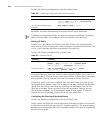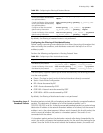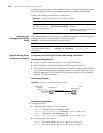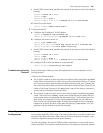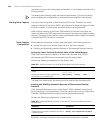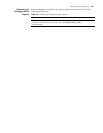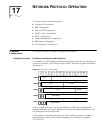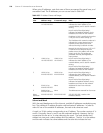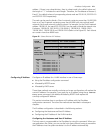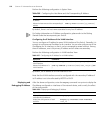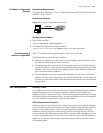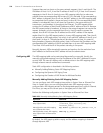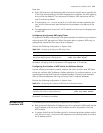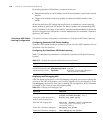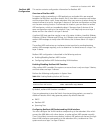
270 CHAPTER 17: NETWORK PROTOCOL OPERATION
When using IP addresses, note that some of them are reserved for special uses, and
are seldom used. The IP addresses you can use are listed in Table 265.
Subnet and Mask
With the rapid development of the Internet, available IP addresses are depleting very
fast. The traditional IP address allocation method wastes IP addresses. In order to
make full use of the available IP addresses, the mask and subnet are used.
A mask is a 32-bit number corresponding to an IP address. The number consists of 1s
and 0s. Principally, these 1s and 0s can be combined randomly. However, the first
consecutive bits are set to 1s when designing the mask. The mask divides the IP
address into two parts: subnet address and host address. The bits 1s in the address
and the mask indicate the subnet address and the other bits indicate the host
Table 265 IP Address Classes and Ranges
Network
class
Address range IP network range Note
A 0.0.0.0 to
127.255.255.255
1.0.0.0 to 126.0.0.0 Host ID with all the digits being 0
indicates that the IP address is the
network address, and is used for network
routing.
Host ID with all the digits being 1
indicates the broadcast address, that is,
broadcast to all hosts on the network.
IP address 0.0.0.0 is used for the host that
is not put into use after starting up.
The IP address with network number as 0
indicates the current network and its
network can be cited by the router
without knowing its network number.
Network ID with the format of 127.X.Y.Z
is reserved for self-loop test and the
packets sent to this address will not be
output to the line. The packets are
processed internally and regarded as
input packets.
B 128.0.0.0 to
191.255.255.255
128.0.0.0 to
191.254.0.0
Host ID with all the digits being 0
indicates that the IP address is the
network address, and is used for network
routing.
Host ID with all the digits being 1
indicates the broadcast address, that is,
broadcast to all hosts on the network.
C 192.0.0.0 to
223.255.255.255
192.0.0.0 to
223.255.254.0
Host ID with all the digits being 0
indicates that the IP address is the
network address, and is used for network
routing.
Host ID with all the digits being 1
indicates the broadcast address, that is,
broadcast to all hosts on the network.
D 224.0.0.0 to
239.255.255.255
None Addresses of class D are multicast
addresses.
E 240.0.0.0 to
255.255.255.254
None The addresses are reserved for future use.
Other
addresses
255.255.255.255 255.255.255.255 255.255.255.255 is used as LAN
broadcast address.



